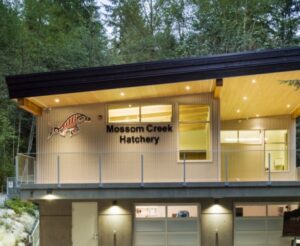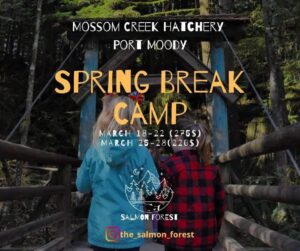As we say goodbye to 2021 and hope for a better year in 2022, we want to express our appreciation to our Mossom Creek volunteers. We especially thank our core volunteers who faithfully handled all the necessary work week after week over the past year in all kinds of weather. Mossom was closed to the public until early November because of the pandemic and throughout that time this small group did an amazing job of looking after everything. They continue to do so.
Another big thanks goes to our many supporters and donors for their generosity. These donations allow us to continue our stewardship work in the watershed and help to support our educational efforts.
In the past year we tried very hard to continue our education programs. This was difficult since the public schools were not permitting field trips. In addition, we found it challenging to find someone with the specific environmental, outdoor education skills who was available to lead our programs. We are actively looking and hopefully we may find a retired teacher.
Meanwhile, Shelley Frick has jumped in and done a brilliant job. Shelley is a university educated veteran naturalist and interpreter who provides outdoor programs for the City of Coquitlam. In 2021, she led home school programs at Mossom for small groups and these were quite successful. We also had a great four-week summer camp. Thanks to Shelley, Samantha, Aislyn, Rebecca, Aniela and Graeme for all their hard work to make those sessions so memorable for the day campers. To supplement this program, we secured a Canada Summer Jobs Grant which enabled us to pay our student assistants. We have just applied for a similar 2022 grant. The decision was made at summer’s end to take a break from school programming as most of our help went back to school and SD43 was still not allowing field trips.
We learned to embrace online meetings in 2021, including several well attended community zoom presentations in February including the Cougars in our Backyard presentation by Wildlife-conflict expert Tom Saare, The Fear Factor zoom talk with Dr. Rob Butler, and a photo tour of Our Wild Watershed with Mossom Creek Hatchery co-founders Ruth Foster and Rod MacVicar.
The BIMES board met virtually for most of the year. Our first in-person meeting happened in October and it felt good to be (cautiously) together to review our activities and discuss plans for 2022.
Fish and Chips tagging project
We expect to release our coho smolts in June. The plan is for UBC’s Dr. Scott Hinch and his fisheries research team to surgically implant tiny tags into 100 of those smolts. Pairs of receivers will will be anchored at several pinch points in Burrard Inlet with the help of Rod MacVicar and his skiff. When the smolts swim past these points, we will get a better idea of their migration route (whether they spend time in Indian Arm, for example) and their exit timing and their success in reaching open water beyond Point Atkinson.
These tags are expensive, and this limits the number of fish we can tag. We have secured $15,000 from the Pacific Salmon Foundation and we continue to apply for other grants for this project. In all it is expected to cost Mossom $50,000 in total but it is additionally supported by a huge contribution of materials and expertise from UBC.
Salmon in the City
We hope to build a viewing platform below Ioco Road beside Mossom creek to allow the public to see returning salmon. We have been working with Port Moody Environment and Parks staff and will be requesting Port Moody council to designate the city-owned property as parkland. We have a generous offer to supply all the materials needed to construct the platform. The property has been surveyed and this September, students from Heritage Woods Secondary did the hard work of clearing an area of it that was overrun with blackberries. This has allowed us to identify the best location for the viewing platform. We are grateful for the considerable assistance of Port Moody staff in getting to this point.
Securing funding is a board priority and applying for grants is extremely time consuming. We have applied to Telus Community Grant to put on a BioBlitz, probably in August of 2022, and we hope to hear by March if this application was successful. We met with MP Ron McKinnon to discuss the possibility of securing increased Fisheries and Oceans funding because we have not seen any increase in financial assistance from the government for many years. Our DFO money each year covers only a small fraction of our operating expenses, so we are grateful for ongoing annual donations from Seaspan, Reed Point Marina, and a new generous donations from Pacific Coast Terminals and TheBag.Ca as well as kind gifts from a number of individual supporters.
In December we took possession of a beautiful adult male cougar mount which can be compared in size to the bobcat which we have had for about ten years. What a great educational resource! We get a great many questions about cougars in the watershed and we occasionally see one on our trail cams.
Water quality analysis happens every Sunday thanks to our dedicated water quality team led by board member Jennifer Madoc-Jones. We have developed a very positive relationship with a local company called Flowlink. They have installed a high-tech creek reader which is providing Mossom with immediate real time online results for turbidity, pH, conductivity, and dissolved oxygen. These data are instantly available to our laptops and smart phones. Flowlink technology was designed to ensure that water from construction sites is monitored and treated prior to release. We are communicating with several municipalities to ensure that this technology is considered for all their construction locations. Flowlink is a remarkably community-minded company and their owners are to be congratulated for developing such innovative software.
Hatchery update:
Chum
2021 spawner season was quite difficult and challenging compared too other years.
Mossom chum returns were the smallest we have seen in years. The biggest grouping spotted were in 15-20 range. Because of this we did no Mossom egg take. We were hearing rumours of river otters hanging around the estuary which could have been the reason for the low numbers.
Alouette egg take started off equally difficult. DFO has Mossom scheduled for two dates both were pushed back due to low chum returns in Alouette system. When the numbers started improving DFO found the fence at the hatchery which prevents the salmon from heading further upstream was broken. DFO pushers hard to get this fence repaired and thanks to Brian Smith our community advisor’s determination he was able to secure 87,000 chum eggs.
Coho
Arne had noticed large numbers of coho around Mossom hatchery so Brian and Brendan from DFO along with Arne jumped into action and captured several pair of beautiful coho which we held in our tub till they were rype. Lucky they caught these coho as soon afterwards a family of river otters were spotted and they designated the remaining wild coho Mossom population. Brian secured special permission for us to rear all the coho eggs from the coho captured. So this year we have close to 12,000 coho eggs to take care of. We will keep our usual 4000 the remainder will be released at the fry stage.
All of our 2020 chum and coho stock were released using DFO slip and slide method rather than transporting to various local creeks due pandemic concerns.
Ruth has assembled a 2021 photo collection at this link:
View our online photo gallery for 2021 here
Almost are of the photos are thanks to the fabulous photographic talent of dedicated volunteer, Paul Steeves.
Once again, a big thank you to everyone who helps at Mossom.
Kevin Ryan, President
On behalf of the BIMES Board


